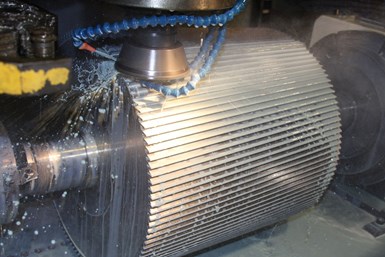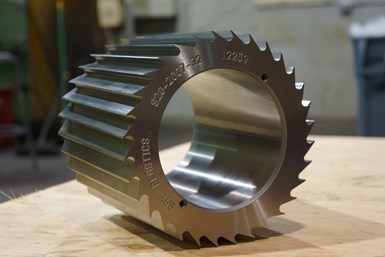Fast Service for Sharpening Pelletizing Rotors
Fast Track service from BPM can repair every brand of rotor in two weeks or fewer.
To help plastics processors and compounders keep their pelletizers cutting at peak performance, Bay Plastics Machinery (BPM) has introduced BPM Fast Track, a unique rotor sharpening service.

Large rotor being machined. Photo Credits

Clean rotor.
When pelletizer rotors lose their edge, honing them isn’t as simple as, say, sharpening a knife. In fact, pelletizing rotors have three distinct angles that all require a specialized process to sharpen properly. BPM’s technicians can sharpen every brand of rotor and even build new ones if required.
With BPM Fast Track, after receiving the customers’ rotors, Bay analyzes and sharpens them, then ships them back to customers — and and the entire process takes only two weeks or less. BPM also provides this 2-week-or-less repair service for feed rolls.
“One-week turnarounds for sharpening are not unusual for us,” notes Ryan Brant, BPM’s rotor cell manager. “If the repairs require welding, that takes two weeks.” By contrast, said Brant, it can take other repair services months to complete a sharpening.
Related Content
-
How Polymer Melts in Single-Screw Extruders
Understanding how polymer melts in a single-screw extruder could help you optimize your screw design to eliminate defect-causing solid polymer fragments.
-
Use Interactive Production Scheduling to Improve Your Plant's Efficiencies
When evaluating ERP solutions, consider the power of interactive production scheduling to effectively plan and allocate primary and secondary equipment, materials and resources on the overall production capacity of the business and conclude that this is a key area that cannot be overlooked.
-
How Screw Design Can Boost Output of Single-Screw Extruders
Optimizing screw design for a lower discharge temperature has been shown to significantly increase output rate.




